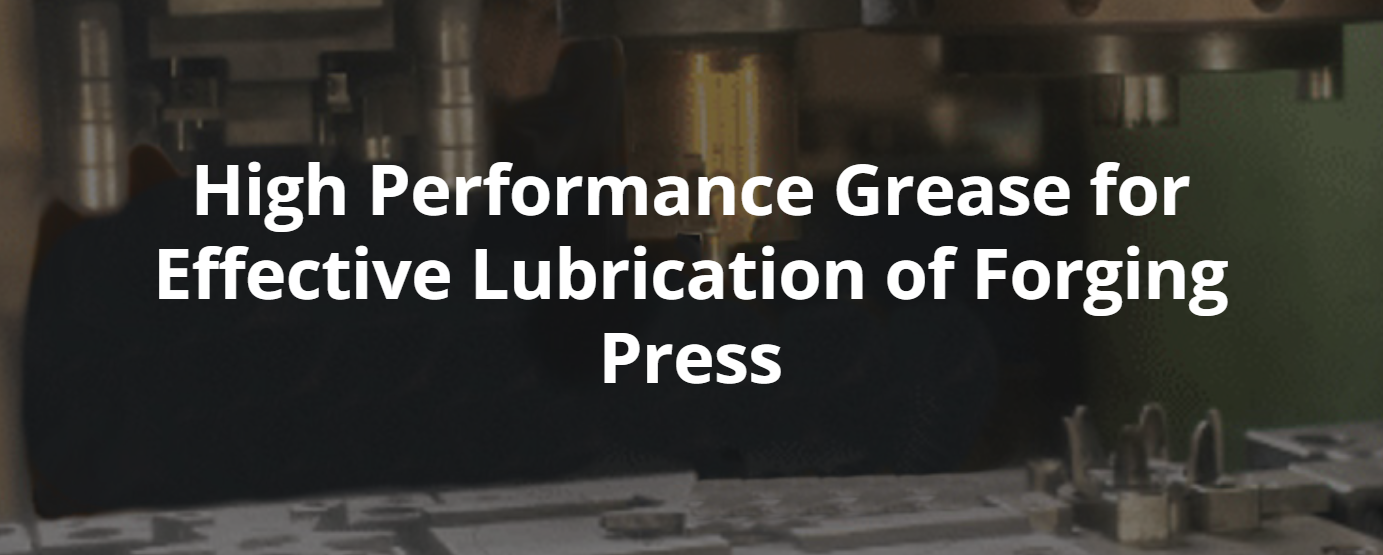Metal forging is the process by which metals are formed and shaped using compressive forces. Depending on temperature of the metal being worked upon, the process is classified into cold, warm and hot forging. Many automotive parts are forged due to unique advantages which include increased strength, different size/shape and mass production.
A typical forging press involves the moving vertical ram, die casts, bolster plate, ejector and frame. The vertical rams apply gradual and controlled pressure to the die holding a heated metal workpiece, causing it to take the shape of the die cavity. Due to the extreme pressure and shock loads involved in the process, the type and quality of lubricant used affects performance of these ram-based vertical presses.
Incorrect lubricant selection and inconsistent lubrication can reduce bearing life and lead to performance issues, including:
- Slow movement of the ram resulting in improper component accuracy
- Wear of the phosphor bronze bush bearings used in connecting rod, brake and clutch
- Excessive lubricant consumption due to frequent pumping
- Grease leakage from bearings resulting in fire hazard incidents
- Entry of forging dust and scale particles inside the bearings accelerating wear
- Sudden increase in operating temperatures of the bearing
- Chocking of distributors used in centralized lubrication system
The application requires special lubrication requirements. BECHEM provides best in class, special greases for forging presses with the following advantages:
- Longer life span of bearings as a result excellent wear protection with BECHEM’s range of greases. Customers have experienced bearing life of over five years with BECHEM Premium
- Resists bearing pitting: The special greases for the application create a high-pressure resistant film a result of the special additive package in the formulation.
- Strong adhesive property of the grease due to special tackiness improvers ensure a consistent lubrication film in the contact zone of eccentric shafts and phosphor bronze bearings
- Proven thickener and base oil combination for effective sealing of bearings to prevent external contamination.
- Prevent choking: Uniform and homogeneous structure of grease ensures no choking or clogging of distributors and tubing even if the machine is not in use for few days.
- Reduces grease leakage to ensure cleaner workplace as well as eliminate incidents of fire hazard.
The below case study illustrates how customized lubrication solutions for the hot forging press enhanced production efficiency at a renowned automotive component manufacturing brand.
Customer: A leading automotive components manufacturer in the world supplying a wide range of automotive components (such as distributor, gibs, connecting rod, brake and clutch journal etc), catering to both domestic and international markets.
The customer was using an extreme pressure grease of a popular brand “X” which was applied through pneumatic lubrication pump. The ‘On’ time for the pump was set 50 seconds.
Challenges experienced by the Maintenance team:
- Slow movement of ram in the mechanical system observed
- Sudden and abnormal rise of temperature in bearings.
- Severe grease leakage leading to higher grease consumption and fire hazard incidents
- During long idle hours, the issue of ‘distributor chocking’ was noticed.
- The removal of old grease from the equipment was a strenuous process.
The hot forging machine with a capacity of 2500, Tons has in-built temperature sensors, a modern grease pump and distribution system in place.
- Component name: Tripod Joint
- Number of strokes – 13 strokes/min
- Lubrication cycle- once in 100 strokes
- of strokes per Job- 3 strokes
- of stokes per Minute – 18 strokes
- Grease consumption per day – 21 Kg. /24hrs
- Monthly grease consumption: 504 Kg.
By considering the operational parameters and challenges, the BECHEM Application Engineering team recommended the high-performance grease “BECHEM Premium” for a trial.
Observations made during the trial period:
Trial period : 60 days
- Normal movement of the ram was noticed throughout the trial period.
- The re-lubrication cycle extended to 125 strokes in 30 Seconds.
- The issue of grease dripping was minimized.
- Operating temperature of the bearings were stable and sustained.
- Grease consumption reduced by 46.5% resulting in reduced operational costs.
- Issue of grease leakage was minimized reducing the risk of fire hazards.
- Process of degreasing was much easier.


